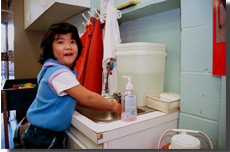 |
The Learning Ladder
|
| Module 5: Health and Safety in Early Care and Education Programs | ||||
| Part 1 | Part 2 | Part 3 | Part 4 | Part 5 |
Healthy Classrooms
 Working in a program that cares for children exposes both children and adults to
germs
that cause illnesses. Here are three simple ways that we can reduce sickness in our programs:
Working in a program that cares for children exposes both children and adults to
germs
that cause illnesses. Here are three simple ways that we can reduce sickness in our programs:
Fresh air
Every day, open windows and get new air into your classroom. This will remove some of the germs that can stay in the air.
Cleaning of classroom surfaces and toys
Careful and routine cleaning of classroom surfaces and toys also reduces the spread of germs. It is important that we use a mixture of bleach and water to make sure that we disinfect our classrooms. Centers supply their classrooms with spray bottles that contain a solution (one part bleach to ten parts water) to make sure that they clean the surfaces and toys well. This method can keep things free of germs and infection.
Washing hands
The best way to try to stop the spread of infectious diseases is by handwashing. When children and staff wash their hands often, they reduce the risk of infecting themselves and others with the germs that they are carrying on their hands.
There are 4 simple steps to washing hands for adults and children to follow:
- Put your hands under warm, running water. Don't use a tub of water for the entire class to use. Using the same container of water can give germs to others.
- Use soap. Liquid soap is best.
- You must rub your hands together a number of times. This action removes germs. Put your hands under warm, running water and rinse hands well.
- Dry your hands with a paper towel. Do not use the towel again or give it to someone else to use. Turn the water off using a paper towel, not your clean hands. Throw the towel away.
When should children wash their hands?
- before eating or drinking
- after using the toilet
- after coming in from the playground
- after coughing, sneezing, or blowing their nose
When should teachers wash their hands?
- arriving at the center
- before eating or handling food
- before feeding a child
- after diapering and toileting
- after cleaning
- after caring for a sick child
| If you finished the reading, go to the activities for Part 4. | |
